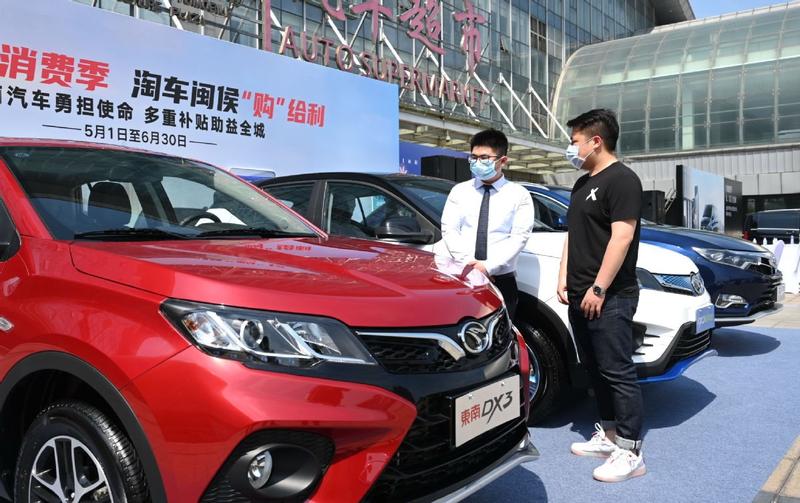 Cars on sale at a commercial plaza in Fuzhou, capital of Fujian province. (PHOTO / XINHUA)
Cars on sale at a commercial plaza in Fuzhou, capital of Fujian province. (PHOTO / XINHUA)
China's monthly vehicle sales rose for the first time in nearly two years in April with production returning to 2019 levels, an indication that the industry has returned to normalcy since the novel coronavirus outbreak, according to a leading industry association.
A total of 2.07 million vehicles were sold in April, up 4.4 percent on a yearly basis, while vehicle output rose by 2.3 percent on a yearly basis to 2.1 million units during the same period, the China Association of Automobile Manufacturers said on Monday.
The first monthly sales growth since July 2018 came after a 43-percent fall in March and a 79-percent slump in February, as the novel coronavirus outbreak distanced people from showrooms in the world's largest auto market.
China is currently the role model for renewing vitality in automotive markets around the world and it will stabilize Volkswagen Group's business while operations in Europe are still slowly coming back
Stephan Woellenstein, CEO, Volkswagen Group
ALSO READ: China auto sales likely rose in April, ending 2 years of decline
Chen Shihua, deputy secretary-general of the CAAM, said the rebound was primarily a result of the country's effective efforts in controlling the pandemic and a slew of government policies, including extending subsidies on new energy vehicles and offering more license plates for gasoline cars in some big cities.
The association said the rebound in April fell short of expectations and it estimated that the growth trend will likely continue to improve in the next two months due to the anticipated release of pent-up demand.
In terms of production, 203 out of 204 car manufacturing plants of major Chinese and international car groups had resumed operations in China by Monday, said the CAAM.
"If there is demand, we can ramp up to produce more vehicles than last year," said Xu Haidong, deputy chief engineer of the association.
Buoyed by the robust recovery in April, many carmakers have expressed confidence about market potential in the subsequent months.
China's largest private carmaker Geely sold 105,468 vehicles last month, up 2 percent from the same period last year. "We are confident on the sales performance in May and in the second half of the year, as we launch new models and resume deliveries that were affected by the coronavirus," said Geely President An Conghui.
China has become the lone ray of hope for foreign automakers including Volkswagen and GM, as the global automotive industry has been badly hit by the coronavirus pandemic.
SAIC-GM delivered 111,200 Buicks, Chevrolets and Cadillacs, up 13.6 percent from the same month last year. SAIC-GM-Wuling sold 127,000 vehicles last month, up 13.5 percent on a yearly basis. FAW-Volkswagen delivered 165,734 vehicles under the Volkswagen, Audi and Jetta brands, up 9.9 percent year-on-year.
"We have left the deepest valleys behind us, and are now on the climb to the peaks again," said Volkswagen Group China CEO Stephan Woellenstein in a LinkedIn post last week.
"China is currently the role model for renewing vitality in automotive markets around the world and it will stabilize Volkswagen Group's business while operations in Europe are still slowly coming back," said Woellenstein.
Amid growing optimism that China's auto industry is improving, industry experts have urged caution and said both sales and production in the country could take a big hit if the health crisis is not curbed overseas.
"My message is one of cautious optimism. It would be wrong to think that daily life is going to return to completely normal soon," said Woellenstein.
The CAAM said the recovery is unlikely to recoup the losses of previous months. Sales in the first four months totaled 5.76 million units, down 31.1 percent on a yearly basis.
READ MORE: China's auto market to bottom out this year and next
It estimates that sales this year could fall by 15 percent from the over 25 million units sold in 2019. If the pandemic cannot be effectively controlled outside China, the worse-case scenario could be a slump of up to 25 percent, it said.
China's vehicle exports are expected to drop by 200,000 units this year, from about 1 million in 2019, as the pandemic erodes global demand, said Chen, the CAAM official.
Chen further said another big concern is that plant closures overseas could disrupt China's production supply chain. "We are still somewhat reliant on imported parts, including those for some engines and transmissions," he said.


